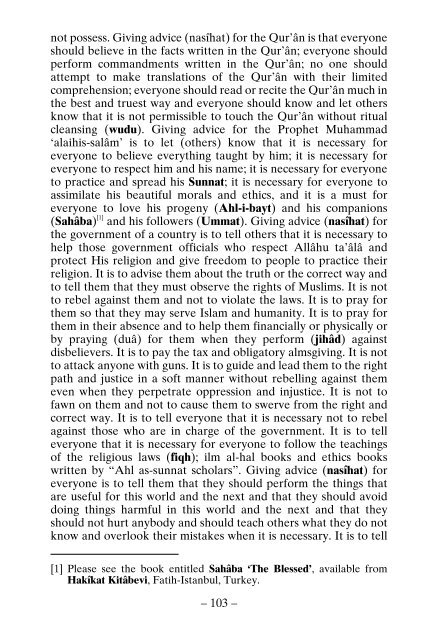Ethics of Islam
Ethics of Islam is taken from the book Berîka by Muhammad Hâdimi. Immorality and ways to get rid of it; 40 depravities and cures to them; usefulness of ethics; what is a soul; strengths of a soul; Personalities emanating from wisdom, courage, chastity and justice are extensively explained.
Ethics of Islam is taken from the book Berîka by Muhammad Hâdimi. Immorality and ways to get rid of it; 40 depravities and cures to them; usefulness of ethics; what is a soul; strengths of a soul; Personalities emanating from wisdom, courage, chastity and justice are extensively explained.
Create successful ePaper yourself
Turn your PDF publications into a flip-book with our unique Google optimized e-Paper software.
not possess. Giving advice (nasîhat) for the Qur’ân is that everyone<br />
should believe in the facts written in the Qur’ân; everyone should<br />
perform commandments written in the Qur’ân; no one should<br />
attempt to make translations <strong>of</strong> the Qur’ân with their limited<br />
comprehension; everyone should read or recite the Qur’ân much in<br />
the best and truest way and everyone should know and let others<br />
know that it is not permissible to touch the Qur’ân without ritual<br />
cleansing (wudu). Giving advice for the Prophet Muhammad<br />
‘alaihis-salâm’ is to let (others) know that it is necessary for<br />
everyone to believe everything taught by him; it is necessary for<br />
everyone to respect him and his name; it is necessary for everyone<br />
to practice and spread his Sunnat; it is necessary for everyone to<br />
assimilate his beautiful morals and ethics, and it is a must for<br />
everyone to love his progeny (Ahl-i-bayt) and his companions<br />
(Sahâba) [1] and his followers (Ummat). Giving advice (nasîhat) for<br />
the government <strong>of</strong> a country is to tell others that it is necessary to<br />
help those government <strong>of</strong>ficials who respect Allâhu ta’âlâ and<br />
protect His religion and give freedom to people to practice their<br />
religion. It is to advise them about the truth or the correct way and<br />
to tell them that they must observe the rights <strong>of</strong> Muslims. It is not<br />
to rebel against them and not to violate the laws. It is to pray for<br />
them so that they may serve <strong>Islam</strong> and humanity. It is to pray for<br />
them in their absence and to help them financially or physically or<br />
by praying (duâ) for them when they perform (jihâd) against<br />
disbelievers. It is to pay the tax and obligatory almsgiving. It is not<br />
to attack anyone with guns. It is to guide and lead them to the right<br />
path and justice in a s<strong>of</strong>t manner without rebelling against them<br />
even when they perpetrate oppression and injustice. It is not to<br />
fawn on them and not to cause them to swerve from the right and<br />
correct way. It is to tell everyone that it is necessary not to rebel<br />
against those who are in charge <strong>of</strong> the government. It is to tell<br />
everyone that it is necessary for everyone to follow the teachings<br />
<strong>of</strong> the religious laws (fiqh); ilm al-hal books and ethics books<br />
written by “Ahl as-sunnat scholars”. Giving advice (nasîhat) for<br />
everyone is to tell them that they should perform the things that<br />
are useful for this world and the next and that they should avoid<br />
doing things harmful in this world and the next and that they<br />
should not hurt anybody and should teach others what they do not<br />
know and overlook their mistakes when it is necessary. It is to tell<br />
[1] Please see the book entitled Sahâba ‘The Blessed’, available from<br />
Hakîkat Kitâbevi, Fatih-Istanbul, Turkey.<br />
– 103 –

















